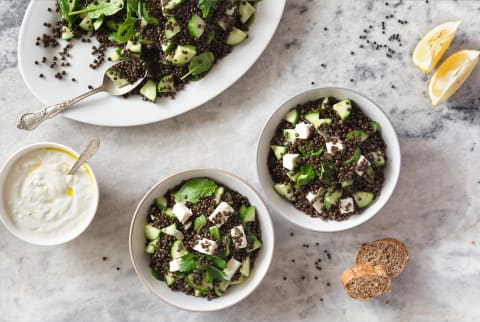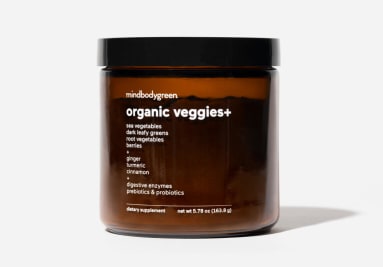This Is The Best Diet To Support Reproductive Health, In Case You're Curious



Focusing on reproductive health isn't just about having babies. In fact, many of the holistic lessons for supporting reproduction are important for well-being overall. Take it from environmental and reproductive epidemiologist Shanna Swan, Ph.D.: "The lifestyle factors that matter for health are those that matter for reproduction," she says on the mindbodygreen podcast. One of the biggest lifestyle factors? Your diet.
Below, she explains the best diet to support reproductive health (spoiler: You may even follow the plan already).
How to use diet to support reproductive health.
The thing is, the best diet for reproductive health is more of a dual-pronged venture. See, according to Swan, both a Mediterranean diet and a focus on organic fruits and vegetables can support your body's reproductive function.
Mediterranean diet.
If there's one eating plan Swan loves for reproductive health, it's the Mediterranean diet (and given its plethora of health benefits, we're not surprised). You know: "Lower in meat, higher in fruit and vegetables, olive oil instead of butter, and so on and so forth," she adds. Research backs it up, too: One study found that "Mediterranean-type" eating patterns were associated with enhanced reproductive health1 when compared to "Western-type" patterns. For men, in particular, one study shows that a high MedDietScore (which measures how closely they followed the Mediterranean diet) was associated with a higher sperm concentration, total sperm count, and sperm motility2.
As we mentioned up top, many of the factors that help support reproductive health are also ones that optimize overall longevity, so it makes sense a Mediterranean diet (which is associated with increased life span3) would tick both boxes. And if you do eat animal products—hat-tip to Mediterranean diet staples, like omega-3-rich fish, poultry, eggs, cheese, and yogurt—Swan recommends finding less-processed options, if you're able.
Organic fruits and veggies.
Even if you don't follow the Mediterranean diet to a T, Swan recommends adding more plants to your plate at the very least. Additionally, "Eating more fruits and vegetables that are organic is helpful," she notes, as these tend to be free of pesticides and hormone-disrupting chemicals—although, the science is still pretty limited in terms of the correlation.
One study did find that eating fruits and vegetables with low to moderate pesticide residues was associated with a higher total sperm count and sperm concentration4, and plenty of experts anecdotally recommend organic produce to support hormonal health.* But again, we need more hard data.
For now, perhaps focus on filling your plate with the most delicious, diverse range of fruits and veggies you can get your hands on—and if you'd like to add extra oomph to your plant-based meals, you can always use a sprinkle of greens powder (like mbg's organic veggies+) to elevate your recipes. This specific blend is filled with nutrient-packed, hard-to-find USDA-certified organic sea vegetables like kelp and chlorella, and the well-rounded formula can help maintain healthy blood sugar levels and hormonal balance.*
The takeaway.
When it comes to supporting reproductive health, you can't go wrong with adding more fruits and veggies to your diet. According to Swan, the Mediterranean diet may have some specific benefits—as well as organic produce—but at the very least, a balanced plate filled with plants should do the trick. It's advice you may have heard once or twice to optimize your well-being at large—considering your reproductive health and overall health may have close ties, it adds up.

Jamie Schneider is the Beauty Editor at mindbodygreen. She has a B.A. in Organizational Studies and English from the University of Michigan, and her work has appeared in Coveteur, The Chill Times, and more. In her role at mbg, she reports on everything from the top beauty industry trends, to the gut-skin connection and the microbiome, to the latest expert makeup hacks. She currently lives in Brooklyn, New York.

